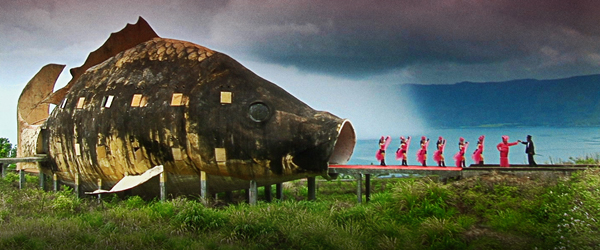‘The Act of Killing’ IS the Art of Documentary Filmmaking

By Jim Lichacz / LA Film Fest Guest Blogger
Some of the best documentary films I’ve ever seen, I’ve seen at the Los Angeles Film Festival. So it was with great anticipation that I went through the film guide, looking for doc treasure. I’m happy to report that, within two days of attending screenings, I’ve hit the doc jackpot with The Act of Killing.
There are a number of ways a director can use the documentary format to tell a compelling story. They can embed themselves into a situation and, with luck and skill, record some amazing real life tales. The subjects will reveal an inner aspect of themselves on film, and the viewer is rewarded with a sense of being there as the insight is imparted. Another technique: the use of historical material or staging of reenactments to create a compelling narrative, giving insight into an event and the people involved.
The Act of Killing breaks new ground in the documentary format by embedding itself into the production of its subjects’ own stylized reenactments. Under the guise of making a movie based on the subjects’ political cleansing of “communism” in 1965 Indonesia, the director creates a perspective-changing tale of paramilitary leaders recounting their deeds, while at the same time inadvertently reflecting on their actions.
At times, the audience feels like a member of the crew participating in the filming of a bizarre historical fiction, while at other times it is a witness to the confessions of a group of political gangsters. The film is deftly edited so the transitions are seamless. It’s not just a simple matter of switching the point of view. Rather, the narrative switches from boastful reenactment to guilt-ridden realization, all in the same take.
The stagings of the killing acts are made in the context of the stylized Hollywood movies the subjects were influenced by at the time. These include gangster film noir, stylized floor show numbers, a spaghetti western send up and more. Interwoven throughout are “pre-production meetings” and “post-production meetings” where the subjects further reveal what is going on in their heads both now, and in the past.
Their accomplices and benefactors make guest appearances on set. While none of them have an idea what is really taking place, they’re caught up in the “let’s make a movie” enthusiasm. The end result leaves one feeling like they’ve just seen something really unique, yet feelings of disgust are equally palpable.
Werner Herzog is quoted as saying about the film: “I have not seen a film as powerful, surreal and frightening in at least a decade… It is unprecedented in the history of cinema.” Granted, Herzog is an executive producer of the film, but independent reviewers have echoed his belief and numerous international awards have been garnered.
The film is set to be distributed nationwide and is scheduled to be shown in Los Angeles from July 26 to August 1 at the Landmark Nuart theatre. In the meantime, I sense the Festival still has more doc gold to unearth.
